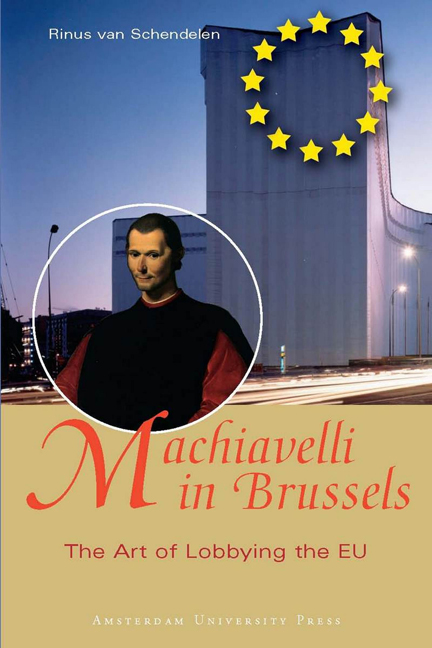Book contents
- Frontmatter
- Contents
- Detailed contents
- Preface
- List of Figures
- List of Abbrevatiations
- 1 The Europeanisation of Public Affairs
- 2 The Playing Field: EU Common Decision-Making
- 3 Pushing the Buttons of ‘Brussels’
- 4 Managing the EU Arena
- 5 Managing the Home Front
- 6 Managing the Fieldwork
- 7 The Limits of EU Public Affairs Management
- 8 Lobbying and EU Democracy
- References
- Index
4 - Managing the EU Arena
Published online by Cambridge University Press: 14 January 2021
- Frontmatter
- Contents
- Detailed contents
- Preface
- List of Figures
- List of Abbrevatiations
- 1 The Europeanisation of Public Affairs
- 2 The Playing Field: EU Common Decision-Making
- 3 Pushing the Buttons of ‘Brussels’
- 4 Managing the EU Arena
- 5 Managing the Home Front
- 6 Managing the Fieldwork
- 7 The Limits of EU Public Affairs Management
- 8 Lobbying and EU Democracy
- References
- Index
Summary
How to Lobby Better?
The simple-minded or amateurish lobby group will regard this question as superfluous. It knows what it wants to get from the EU officials and it finds their names and addresses in some EU directory. Then it approaches them as directly as possible and it tries to convince them that their best response is to comply with the demand soon. If it gets a refusal, it will probably make a lot of noise, on both the national and the EU scene, and launch a second strike, now joined by a number of ‘friends’ that it has found in the meantime. It may also get some advice from a semi-amateurish or semi-professional group already with some experience on the EU playing field. Then it may follow some rules of thumb. For example, that the best actors to approach are one's national PR officials, one's countrymen in the Parliament and one's regional officials in the Commission DG, and that the best way of approaching them is a free lunch together with some friends. The conscious or professional lobby group watching the meeting critically considers this charming, informal, quiet and indirect approach as usually better than the opposite, confrontational style, but not necessarily the best.
The professional group knows that, in the competitive EU arena, the best way to lobby always depends on the specific situation. Sometimes even a formal, demanding, noisy and/or direct style may be the best. The professional group considers, first of all, the broad concept of ‘the situation’. Nowadays it is taken as a synonym for arena and broken down into at least the four elements of stakeholders, issues, time and arena boundaries. The second thing to think about is how to collect useful information on these important elements. By making such an arena analysis the professional group can identify its friends and enemies, the issues at stake, the time aspects and the differences between the insiders and the outsiders. All this is a matter of window-out preparatory work at home. Then it may know how to lobby, whom to lobby, where and on what issues most effectively and efficiently. Through window-in activities it can subsequently apply the best practices of managing an EU arena and its four constituent parts.
- Type
- Chapter
- Information
- Machiavelli in BrusselsThe Art of Lobbying the EU, pp. 131 - 166Publisher: Amsterdam University PressPrint publication year: 2004



